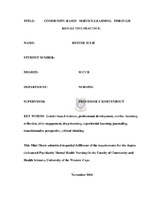| dc.description.abstract | Domestic violence is a pervasive problem in South Africa. The School of Nursing at the University of Western Cape has responded to the challenge of training sensitive, knowledgeable and skilled health personnel by developing a Management of Gender- Based Violence Module. The purpose of this study is to describe the professional and personal development of nursing students who were placed at the Saartjie Baartman Centre for Abused Women and Children for the service-learning trial run of this Gender- Based Violence module in 2003. A qualitative, contextual, and descriptive design was therefore used to provide rich information from in-depth descriptions of students’ perceptions and experiences with regard to the service-learning module. Purposive, convenient sampling was used because the key informants, 27 female students involved in the trial run of the module, were selected to “illuminate" the research question. Content analysis was done and to ensure credibility, data triangulation was done using focus group, project reports and the students’ journals. Informed consent to use data from the previously mentioned sources was obtained from students. The overall findings indicate that the service-learning programme allowed students to achieve the goals defined by the community, services and the university. Students came to understand the supportive roles that health professionals can play and recognised that the development of the attributes of caring, advocacy and civic ngagement is essential to their professional development. Comments in their reflective journals revealed that students valued their service-learning experience, and believed that this experience would expand into future collaborative relationships within civil society. The recommendation is that further in depth research be conducted given the promise shown by this educational approach. | en_US |

